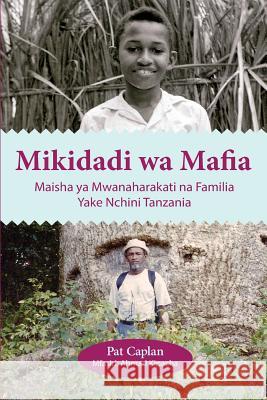Mikidadi wa Mafia. Maisha ya Mwanaharakati na Familia Yake Nchini Tanzania » książka
Mikidadi wa Mafia. Maisha ya Mwanaharakati na Familia Yake Nchini Tanzania
ISBN-13: 9789987082957 / Angielski / Miękka / 2014 / 190 str.
Pat Caplan is a social anthropologist who began doing research on Mafia Island for her Ph.D. in the 1960s when Mikidadi and his relatives made her part of their family . She has continued to revisit the island periodically since then and has published several books and written many articles based on her research. Her books include 'African Voices, African Lives' and she has also made a film about Kanga village: Life on Mafia Island (www.youtube.com) with a Swahili version 'Maisha ya Watu Kisiwani Mafia'. In addition, she maintains a web site about Mafia: www.mafia-island-tanzania.gold.ac.uk which includes a historical photo gallery. Pat Caplan is retired from full-time teaching, but still gives lectures and conference papers, carries out research and publishes. She also enjoys her five grandchildren. The book: The idea for this book has grown out of an engagement with Mafia Island, Tanzania over the last forty-five years, during which time I have made seven research trips there, and published numerous articles and books. Some people on the island have become close friends, indeed quasi-kin, and I have been closely involved in their lives. One such person, whom I knew when he was an adolescent back in 1965, was Mikidadi Kichange, who treated me as his older sister for all the years of our friendship, until his untimely death in 2002. Apart from our meetings when I was in Tanzania, he shared through regular letters his education, training in forestry, national service, marriage and the birth of two daughters, the care of many children of relatives, his employment and his founding of an NGO for the betterment of the island. Although Mikidadi never managed to return to full-time education as he had wished, he read widely in Swahili, English and Arabic. By the time of our last meeting in the summer of 2002, when we worked together for several months on Mafia, he had become a colleague and interlocutor, as well as a 'younger brother' and friend. Since his unexpected death in the autumn of 2002 at the age of 49 I have considered how he might be remembered by the writing of a book about his life which would also illustrate the profound changes which have taken place on Mafia Island, and in Tanzania more widely since independence. I would call this work biographical history, as well as historical biography in which the lives of ordinary people reveal their struggles, constraints, and, as in this case, an extraordinary ability to overcome their circumstances.
Pat Caplan is a social anthropologist who began doing research on Mafia Island for her Ph.D. in the 1960s when Mikidadi and his relatives made her part of their family . She has continued to revisit the island periodically since then and has published several books and written many articles based on her research. Her books include African Voices, African Lives and she has also made a film about Kanga village: Life on Mafia Island (www.youtube.com) with a Swahili version Maisha ya Watu Kisiwani Mafia. In addition, she maintains a web site about Mafia: www.mafia-island-tanzania.gold.ac.uk which includes a historical photo gallery. Pat Caplan is retired from full-time teaching, but still gives lectures and conference papers, carries out research and publishes. She also enjoys her five grandchildren. The book: The idea for this book has grown out of an engagement with Mafia Island, Tanzania over the last forty-five years, during which time I have made seven research trips there, and published numerous articles and books. Some people on the island have become close friends, indeed quasi-kin, and I have been closely involved in their lives. One such person, whom I knew when he was an adolescent back in 1965, was Mikidadi Kichange, who treated me as his older sister for all the years of our friendship, until his untimely death in 2002. Apart from our meetings when I was in Tanzania, he shared through regular letters his education, training in forestry, national service, marriage and the birth of two daughters, the care of many children of relatives, his employment and his founding of an NGO for the betterment of the island. Although Mikidadi never managed to return to full-time education as he had wished, he read widely in Swahili, English and Arabic. By the time of our last meeting in the summer of 2002, when we worked together for several months on Mafia, he had become a colleague and interlocutor, as well as a younger brother and friend. Since his unexpected death in the autumn of 2002 at the age of 49 I have considered how he might be remembered by the writing of a book about his life which would also illustrate the profound changes which have taken place on Mafia Island, and in Tanzania more widely since independence. I would call this work biographical history, as well as historical biography in which the lives of ordinary people reveal their struggles, constraints, and, as in this case, an extraordinary ability to overcome their circumstances.











